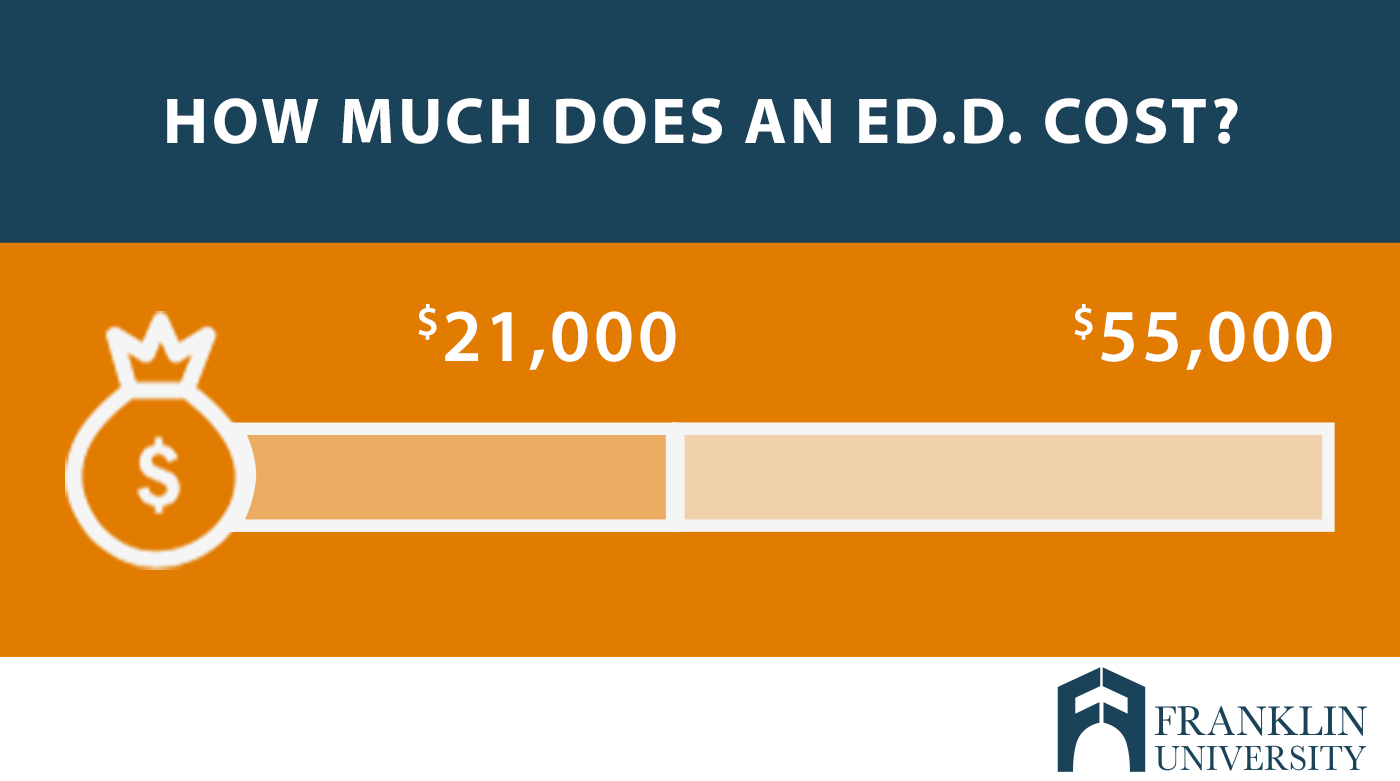Request Information
We're Sorry
There was an unexpected error with the form (your web browser was unable to retrieve some required data from our servers). This kind of error may occur if you have temporarily lost your internet connection. If you're able to verify that your internet connection is stable and the error persists, the Franklin University Help Desk is available to assist you at helpdesk@franklin.edu, 614.947.6682 (local), or 1.866.435.7006 (toll free).
Just a moment while we process your submission.

The Doctorate in Education: Is it Worth It?
At some point along their career track, many educational professionals eventually weigh the decision to earn a Ph.D. or Ed.D. in education.
In our last blog post, we examined the differences between the Ph.D. and Ed.D. and the benefits an Ed.D. can offer those pursuing leadership roles in education—as well as positions in nonprofit and government agencies and private sectors. We also surveyed the differences among Ed.D. programs, how to choose a college or university, and what to expect from the curriculum.
But what about time and cost? After you complete your Ed.D. will you see an increase in career opportunities and salary? In other words, is the juice really worth the squeeze?
Let’s take a look.
How Long Will It Take To Earn a Ed.D.?
If you’re considering earning your Ed.D. in education, you’ve most likely already completed your M.A. or M.A.Ed. Like a master’s degree, a doctorate takes a significant time commitment and a high level of personal dedication. It’s not easy.
While it’s possible to earn the degree in as little as two years of full-time study, most students don’t take this route. Unlike Ph.D. candidates, most Ed.D. candidates are employed full-time in the education field and choose to continue their jobs alongside their studies.
Depending on the course load and the design of the dissertation or capstone project, the degree can take four, five, or up to seven years at most.
How Much Does an Ed.D. Cost?
While the length of time you’ll spend working on your Ed.D. is important, it’s also essential to weigh the financial commitment of the degree. Here are some points to keep in mind when estimating the investment you will need to make to earn an Ed.D.:
- Tuition Costs. A typical Ed.D. program will require 60-66 credits. Tuition costs per credit can range from $350 to $775, resulting in a final price tag of $21,000 to $55,000 for the degree. Also look into any additional fees and the cost of attending orientation and conferences, and any professional memberships or certification programs that may be required.

- Program Location and Cost of Living. If you plan to enroll in a program in another city or state, what will the cost of relocating be? Will there be a change in your overall cost of living in the new location? Will you be able to keep your current job if you move, and if not, will your salary take a hit? More and more schools are now offering Ed.D. degrees entirely online, which can be a great option if there are no good programs in your geographic area and you don’t want to quit your day job.
- Employment Status. If you maintain a full-time job while earning your degree you won’t have to sacrifice your income, healthcare, or 401K savings to go to school.
- Tuition Reimbursement. Many employers offer financial incentives to current employees to advance their education, especially in a field relevant to their job duties. Check to see if your company or organization participates in a tuition reimbursement program. If so, do your research to make sure that the course of study you decide on will qualify.
Earning a doctorate is challenging and rewarding, but do you know what to really expect? Download this free guide for tips and insights to help you prepare for success.
How Can an Ed.D. Impact Earning Potential?
While an Ed.D. can grow your skill set, it can also have a significant impact on your annual earnings. Most senior positions in education and educational administration require an Ed.D., which is one of the main reasons that education professionals choose to pursue the degree. Having an Ed.D. under your belt allows you to advance within your current organization or to acquire a highly sought job at a school or university.
Here’s a look at the top senior education positions and what you can expect to make from each:

The focus of your coursework can also impact your future earnings. Most programs that lead to positions in private schools and companies will likely yield a higher salary than those that lead to nonprofits or public institutions. And a specialization in higher education administration and management will often yield a higher salary than a specialization in early childhood education.
5 Reasons To Earn Your Ed.D. That Have Nothing To Do With an Income Boost
Deciding to pursue an Ed.D. is a big decision that should not be taken lightly. As we’ve seen, it requires a significant commitment of both time and money. However, if you’re looking to advance your career and maximize your earning potential, the degree can open up a range of new possibilities.
Here are the top 5 reasons to earn your Ed.D.:
- You will gain the skills needed to effect change in your organization. An Ed.D. will help you hone your communication, assessment and management skills—skills that are in great demand in today’s educational institutions. If you are interested in taking the wheel, an Ed.D. will prepare you to advance and expand in your school or organization.
- You will develop the tools you need to become a better administrator in today’s educational environments. Education is a rapidly changing field; advanced study into current education trends, including digital literacy and collaborative learning will allow you to apply your knowledge and experience to solve problems and fix gaps in the educational systems around you.
- You can add clout to your résumé to give your new career search a boost.Are you looking to pursue new opportunities in the educational field? Whether you’re hoping to land a job in public education, government or the private sector, an Ed.D. degree will help your résumé stand out from the rest. Many programs offer specializations such as curriculum, instruction and assessment or higher education leadership, allowing you to gain specific skill sets and build your professional network within the area.
- You can learn how to better leverage technology to teach future generations. Educational technology is evolving in new and exciting ways. Learning how to incorporate technology into instructional design will allow you learning challenges in classrooms and training rooms in new ways.
- You will be qualified for senior educational leadership positions. Many elite, well-paying jobs—including superintendent, dean, and college president—require a doctorate. And, according to the Bureau of Labor and Statistics, post-secondary college administration positions will experience faster than average growth in the coming decade.a
Tips on Getting Started
By now you may be 100 percent sure you’re ready to pursue an Ed.D.. Now what? What should you look at when researching programs and an estimating a graduation date? Consider the following factors to help determine a realistic timeline for the degree:
- Transfer Credit. Ed.D. programs typically transfer academic credits earned from any previous doctoral coursework. The amount of credits you can transfer will vary from one university to another. Reaching out to admissions counselors at different schools will help you find the best fit.
- Course Load and Schedule. Whether you will be studying in a classroom or remotely, you’ll need to decide how many classes you will be able to handle per term. This will vary based on the demands of your day job and family commitments, as well as your competence and background in the subject matter. If you are working on an academic schedule you should also look into which programs offer classes during the summer (when you may have more time to commit to your studies).
- Dissertation or Capstone Project. Most Ed.D. programs conclude with a final practicum, where you take what you have learned over the course of your classes and apply it to a real-world problem. The requirements of the dissertation or capstone project will depend on the college or university. If you are able to design your project to focus on your current place of employment, you will likely be able finish in less time than someone who cannot.
#WorthIt
If you are a mid-career education professional looking to advance your career, raise your salary, and impact real change, then the answer is: Yes, it’s worth getting the degree. An Ed.D. requires a significant investment of both time and money—and it isn’t for everyone. But by doing the research and making the investment in the right way, you can position yourself to grow your career in a meaningful, financially rewarding way.





